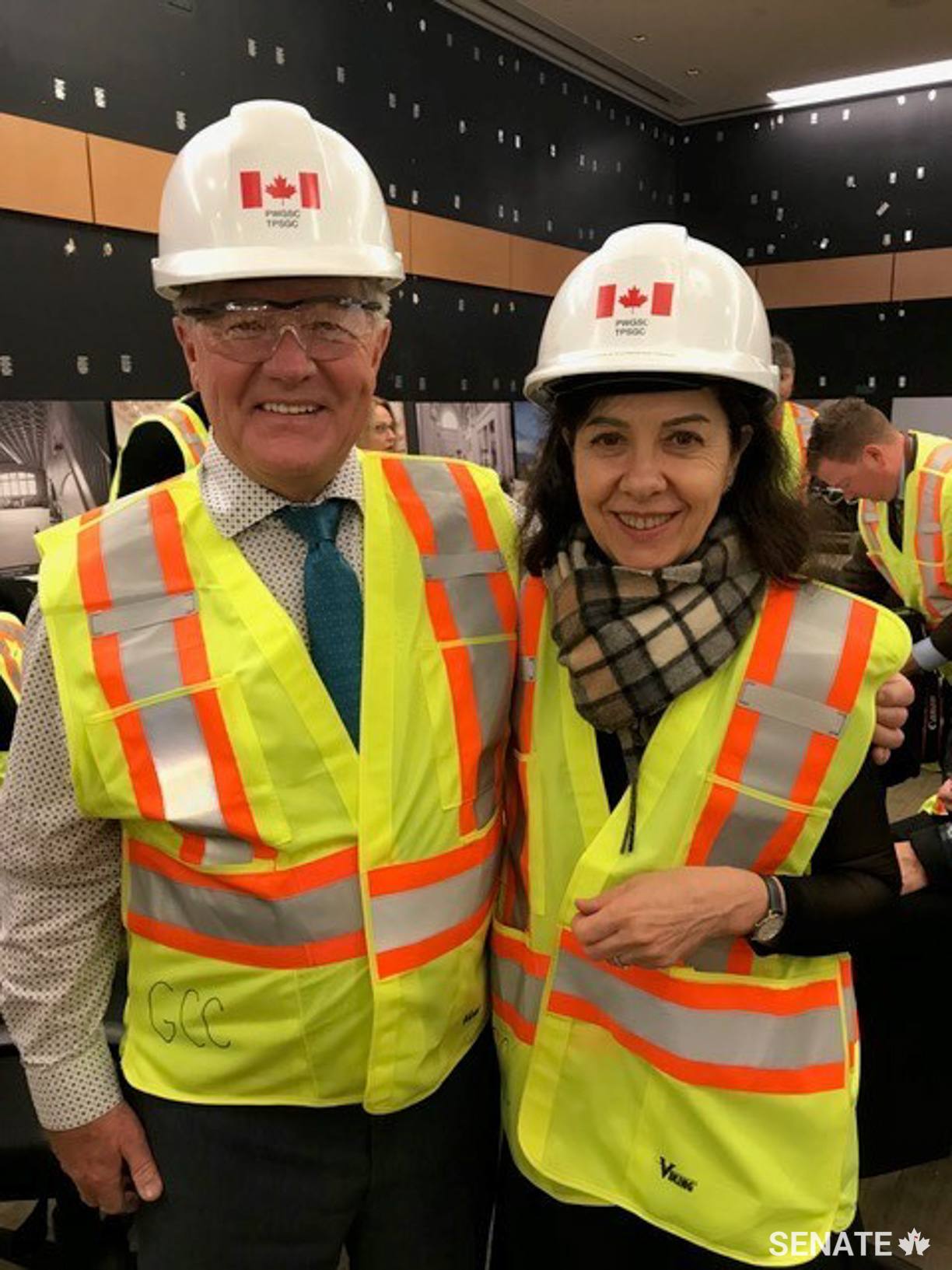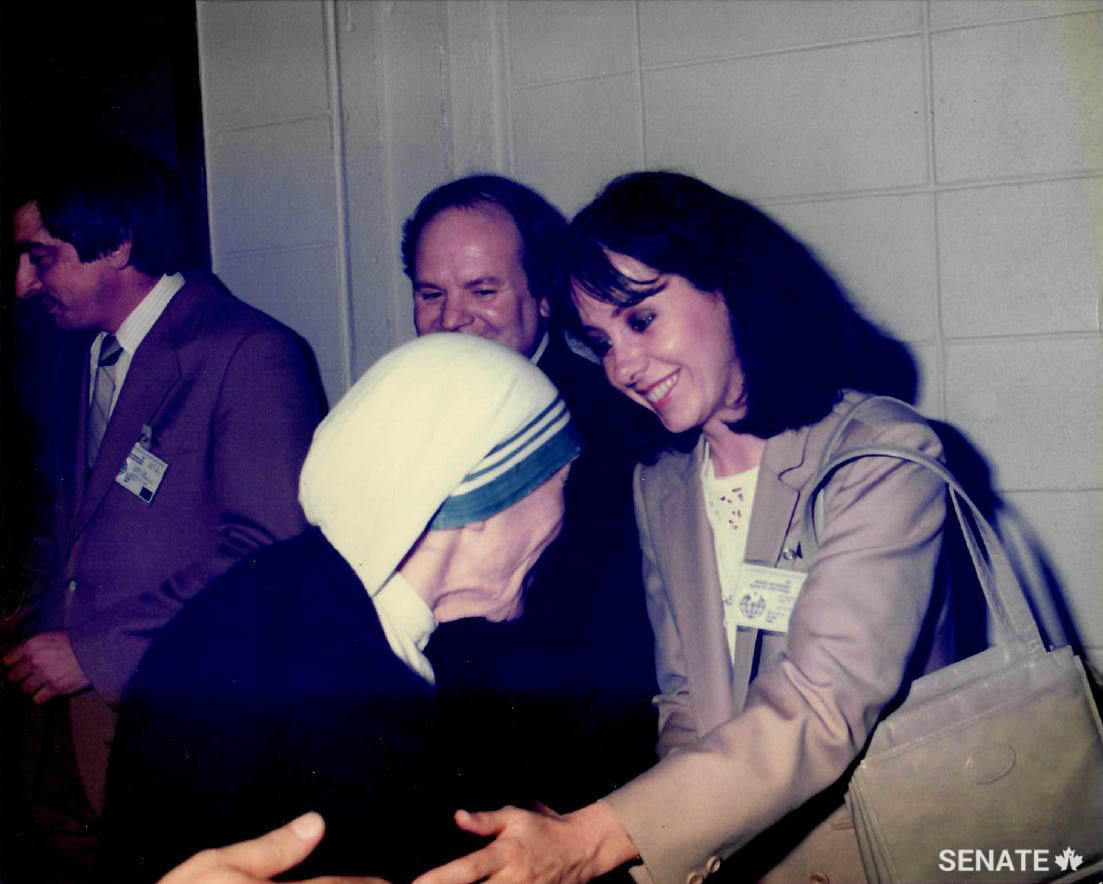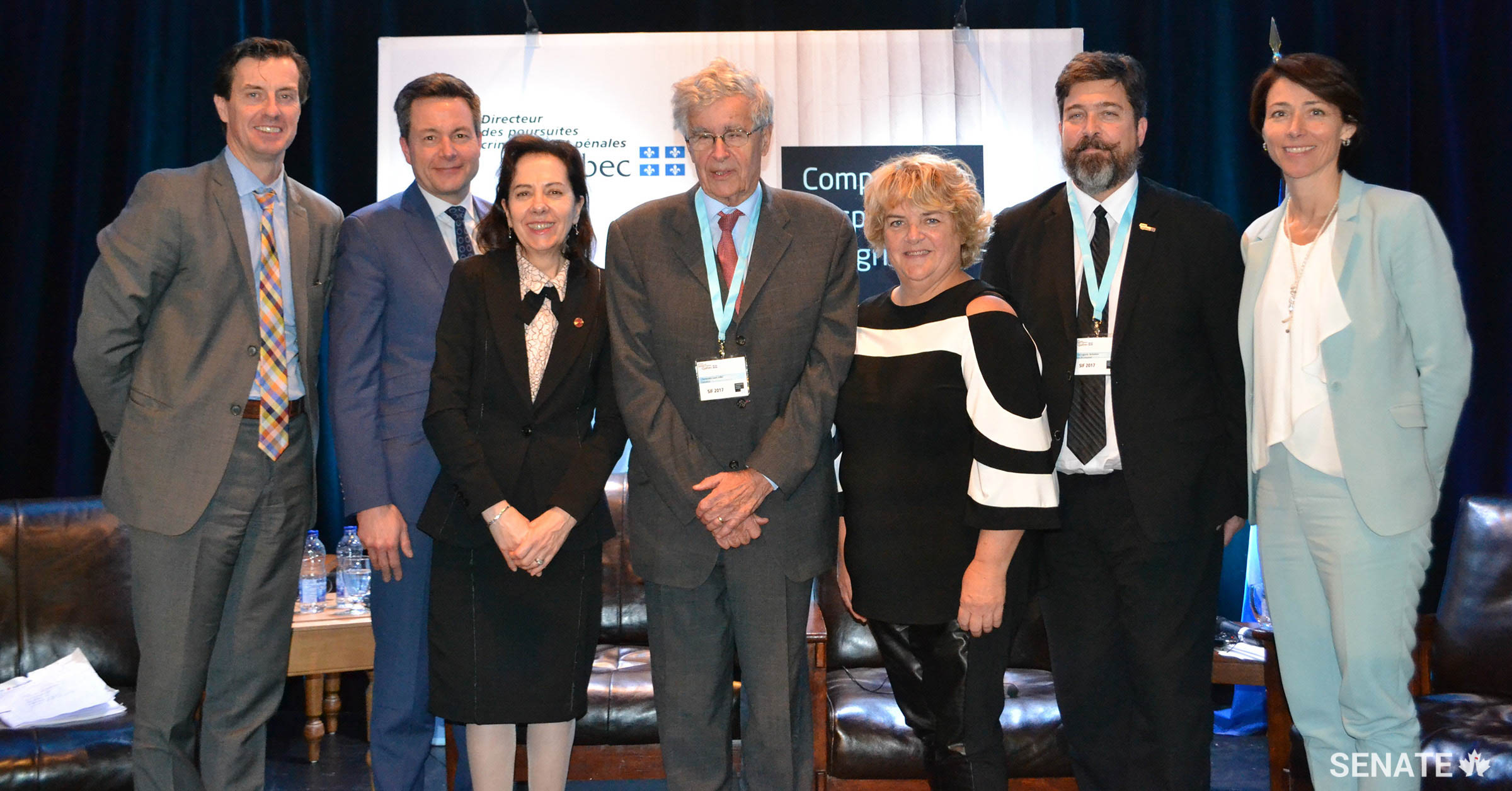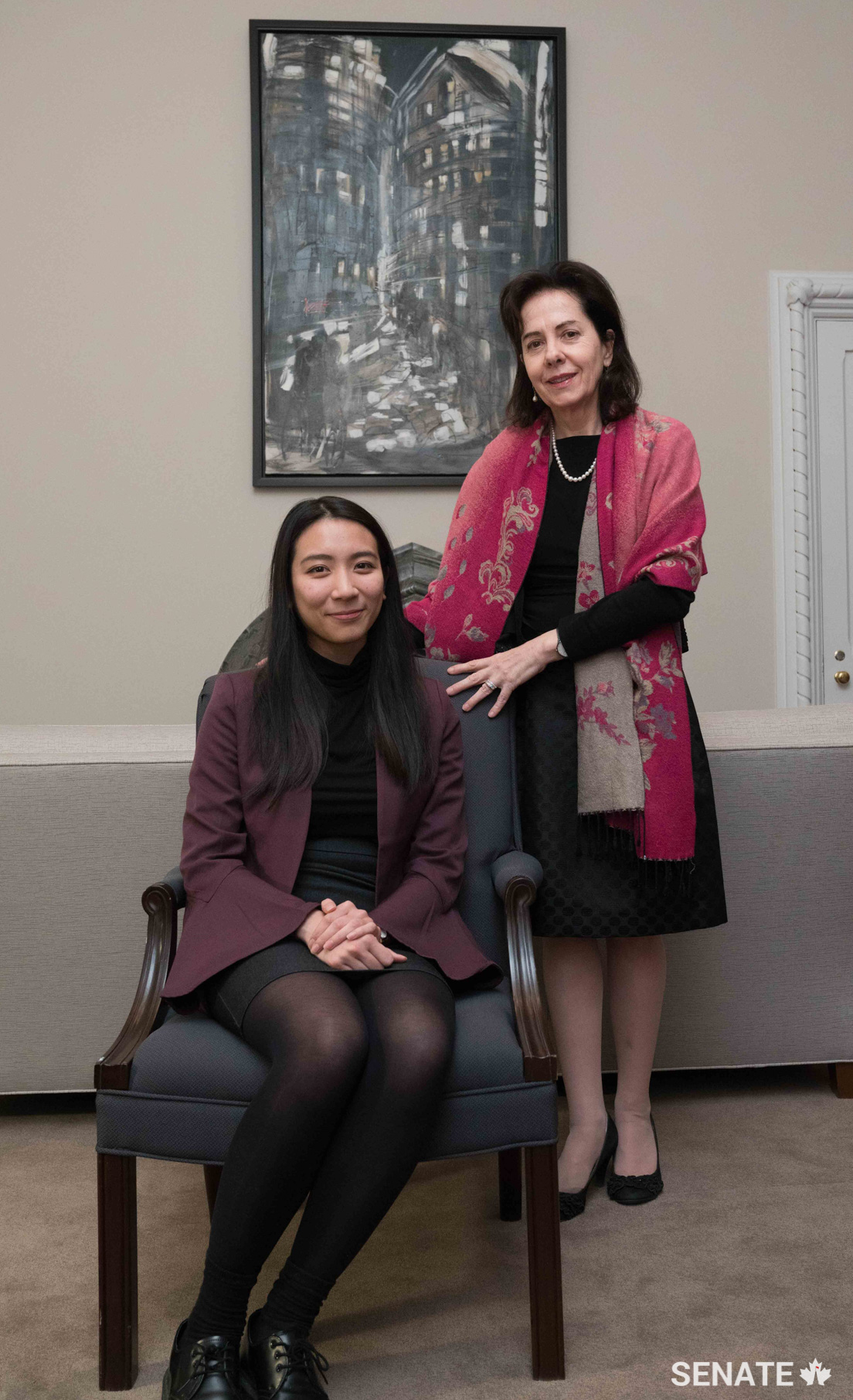Meet Senator Raymonde Saint-Germain

When Senator Raymonde Saint-Germain was appointed to the Senate in December 2016, she began a new chapter in her long career of public service. She had previously served two terms as Quebec’s ombudsperson and she was also deputy minister of the province's government services and relations with citizenship and immigration ministries. Throughout her career, she has been a champion for human rights and freedoms, and an advocate for mental health.
Senator Saint-Germain is chair of the Senate Subcommittee on Human Resources and she is deputy facilitator of the Independent Senators Group.
Who inspired you to get involved in public life?
It feels like I’ve always wanted to be involved, but a number of people helped me get there. My parents were very involved in giving back to the community. For years, I would help my mother prepare Christmas baskets that we would go deliver with my father and three brothers. We would bring them to the Society of Saint Vincent de Paul. There, we met children our own age who would have gone without a turkey dinner and all the trimmings at Christmas if it weren’t for this tradition of neighbours helping neighbours. It was a bittersweet experience. I remember feeling joy for making people happy, but also sadness that poverty existed and the injustice of inequality.
My teachers had a role to play as well, particularly my history and economics teachers. They taught me to gauge the impact of politics and public programs as Quebec flourished in the 1960s during the Quiet Revolution. The importance of social programs that provided access to education really struck me because they promoted social justice and gave less fortunate citizens access to economic independence later in life.
I finished my university studies at a time when entering the public service was on everyone’s radar. At the time, it was a sought-after career in Quebec and competition was fierce. I got my first job at the ministry of social affairs, which dealt with all health care services and social services in Quebec at the time. It was exciting and challenging work.

What do you think are the biggest public policy issues facing Canada today?
Making sure that all public policies balance economic, environmental and social issues beyond the short term. Also, to ensure those policies provide for strong measures to mitigate various negative effects, both across the country and internationally, with a particular focus on Canada’s relationship with the United States.
Why should more Canadians care about what happens in the Senate?
The work of a Senator is first and foremost to legislate, to examine the basis of all bills before the Parliament of Canada and how they will affect the people, organizations and companies that will be subject to them once they receive Royal Assent.




It is important for citizens not only to follow what happens in the Senate and learn about legislative issues, but also to contact their senator to share their point of view about bills that affect them directly.
What legislative or committee work are you most proud of participating in to date?
I like contributing to the good governance of the Senate by being involved on the Committee on Internal Economy, Budgets and Administration (CIBA). I am particularly proud that CIBA members unanimously supported the members of the Subcommittee on Human Resources, which I chair, when they recommended mandatory training for all senators, managers and employees of the Senate to prevent and address harassment, as required. We want the Senate to be an exemplary employer, especially in this area.
Can you tell me about a hidden gem in your region that more Canadians should know about?
I would encourage people to visit the Parc des Voiliers in Sillery, where I was born and grew up, which is now part of Quebec City. The park is between the Mount Hermon cemetery and the cape, near the St. Michel de Sillery church. From the park, you have a great view of the St. Lawrence River, the marina, Île d’Orléans and the South Shore, and even all the way to the Appalachian Mountains on a clear day.
I used to play in this park when I was young. I can’t count the number of soft ice cream cones my friends and I would buy from the Buffet du passant store across the street and later eat as we watched the sailboats on the river.
What is the last book you read or movie you saw that you recommended to someone else and why?
An excellent book by Malcolm Gladwell called “The Tipping Point.” I like Gladwell because he has a unique perspective that steers clear of clichés and he thinks outside the box. In this book, he talks about the power of people on the margins, the ones we underestimate or think are fighting a losing battle at the beginning, but who end up winning thanks to their finesse and hard work. He talks about companies in difficulty that turned things around, such as Hush Puppies, and about Paul Revere, whose ideas helped the Americans win the American Revolutionary War. He also writes about the remarkable achievements of people — including many with autism — who, even though they were on the margins, achieved success in unique and significant ways.
Related articles
Tags
Committee news
Meet Senator Raymonde Saint-Germain

When Senator Raymonde Saint-Germain was appointed to the Senate in December 2016, she began a new chapter in her long career of public service. She had previously served two terms as Quebec’s ombudsperson and she was also deputy minister of the province's government services and relations with citizenship and immigration ministries. Throughout her career, she has been a champion for human rights and freedoms, and an advocate for mental health.
Senator Saint-Germain is chair of the Senate Subcommittee on Human Resources and she is deputy facilitator of the Independent Senators Group.
Who inspired you to get involved in public life?
It feels like I’ve always wanted to be involved, but a number of people helped me get there. My parents were very involved in giving back to the community. For years, I would help my mother prepare Christmas baskets that we would go deliver with my father and three brothers. We would bring them to the Society of Saint Vincent de Paul. There, we met children our own age who would have gone without a turkey dinner and all the trimmings at Christmas if it weren’t for this tradition of neighbours helping neighbours. It was a bittersweet experience. I remember feeling joy for making people happy, but also sadness that poverty existed and the injustice of inequality.
My teachers had a role to play as well, particularly my history and economics teachers. They taught me to gauge the impact of politics and public programs as Quebec flourished in the 1960s during the Quiet Revolution. The importance of social programs that provided access to education really struck me because they promoted social justice and gave less fortunate citizens access to economic independence later in life.
I finished my university studies at a time when entering the public service was on everyone’s radar. At the time, it was a sought-after career in Quebec and competition was fierce. I got my first job at the ministry of social affairs, which dealt with all health care services and social services in Quebec at the time. It was exciting and challenging work.

What do you think are the biggest public policy issues facing Canada today?
Making sure that all public policies balance economic, environmental and social issues beyond the short term. Also, to ensure those policies provide for strong measures to mitigate various negative effects, both across the country and internationally, with a particular focus on Canada’s relationship with the United States.
Why should more Canadians care about what happens in the Senate?
The work of a Senator is first and foremost to legislate, to examine the basis of all bills before the Parliament of Canada and how they will affect the people, organizations and companies that will be subject to them once they receive Royal Assent.




It is important for citizens not only to follow what happens in the Senate and learn about legislative issues, but also to contact their senator to share their point of view about bills that affect them directly.
What legislative or committee work are you most proud of participating in to date?
I like contributing to the good governance of the Senate by being involved on the Committee on Internal Economy, Budgets and Administration (CIBA). I am particularly proud that CIBA members unanimously supported the members of the Subcommittee on Human Resources, which I chair, when they recommended mandatory training for all senators, managers and employees of the Senate to prevent and address harassment, as required. We want the Senate to be an exemplary employer, especially in this area.
Can you tell me about a hidden gem in your region that more Canadians should know about?
I would encourage people to visit the Parc des Voiliers in Sillery, where I was born and grew up, which is now part of Quebec City. The park is between the Mount Hermon cemetery and the cape, near the St. Michel de Sillery church. From the park, you have a great view of the St. Lawrence River, the marina, Île d’Orléans and the South Shore, and even all the way to the Appalachian Mountains on a clear day.
I used to play in this park when I was young. I can’t count the number of soft ice cream cones my friends and I would buy from the Buffet du passant store across the street and later eat as we watched the sailboats on the river.
What is the last book you read or movie you saw that you recommended to someone else and why?
An excellent book by Malcolm Gladwell called “The Tipping Point.” I like Gladwell because he has a unique perspective that steers clear of clichés and he thinks outside the box. In this book, he talks about the power of people on the margins, the ones we underestimate or think are fighting a losing battle at the beginning, but who end up winning thanks to their finesse and hard work. He talks about companies in difficulty that turned things around, such as Hush Puppies, and about Paul Revere, whose ideas helped the Americans win the American Revolutionary War. He also writes about the remarkable achievements of people — including many with autism — who, even though they were on the margins, achieved success in unique and significant ways.


